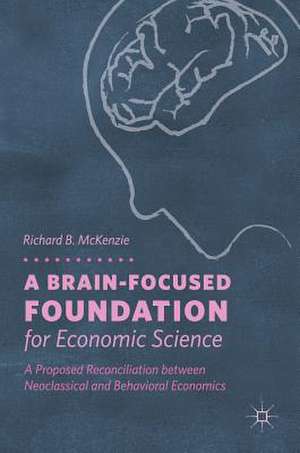A Brain-Focused Foundation for Economic Science: A Proposed Reconciliation between Neoclassical and Behavioral Economics
Autor Richard B. McKenzieen Limba Engleză Hardback – 20 iun 2018
| Toate formatele și edițiile | Preț | Express |
|---|---|---|
| Paperback (1) | 493.14 lei 38-44 zile | |
| Springer International Publishing – 14 dec 2018 | 493.14 lei 38-44 zile | |
| Hardback (1) | 727.18 lei 6-8 săpt. | |
| Springer International Publishing – 20 iun 2018 | 727.18 lei 6-8 săpt. |
Preț: 727.18 lei
Preț vechi: 886.80 lei
-18% Nou
Puncte Express: 1091
Preț estimativ în valută:
139.15€ • 145.58$ • 115.59£
139.15€ • 145.58$ • 115.59£
Carte tipărită la comandă
Livrare economică 02-16 aprilie
Preluare comenzi: 021 569.72.76
Specificații
ISBN-13: 9783319768090
ISBN-10: 3319768093
Pagini: 276
Ilustrații: XV, 219 p.
Dimensiuni: 148 x 210 mm
Greutate: 0.43 kg
Ediția:1st ed. 2018
Editura: Springer International Publishing
Colecția Palgrave Macmillan
Locul publicării:Cham, Switzerland
ISBN-10: 3319768093
Pagini: 276
Ilustrații: XV, 219 p.
Dimensiuni: 148 x 210 mm
Greutate: 0.43 kg
Ediția:1st ed. 2018
Editura: Springer International Publishing
Colecția Palgrave Macmillan
Locul publicării:Cham, Switzerland
Cuprins
1. Economists’ Core Concerns in the History of Economic Thought.- 2. Lionel Robbins and Scarcity.- 3. From Robbins to Friedman and Beyond.- 4. Behavioral Economics, Evolution, and the Human Brain.- 5. The Human Brain: The Ultimate Scarce, Efficient, and Rational Resource.- 6. A Brain-Focused Neoclassical Microeconomics.
Recenzii
Notă biografică
Richard B. McKenzie is the Walter B. Gerken Professor of Management and Society (Emeritus) in the Paul Merage School of Business at the University of California, Irvine, USA. He has authored a large number of books, journal articles, and public commentaries mainly focused on economic policies, and he has maintained an abiding interest in economic methodology over the course of his career.
Textul de pe ultima copertă
This book argues that Lionel Robbins’s construction of the economics field’s organizing cornerstone, scarcity—and all that has been derived from it from economists in Robbins’s time to today—no longer can generate general consent among economists. Since Robbins’ Essay, economists have learned more than Robbins and his cohorts could have imagined about human decision making and about the human brain that is the lynchpin of human decision making. This book argues however that behavioral economists and neuroeconomists, in pointing to numerous ways people fall short of perfectly rational decisions (anomalies, biases, and downright errors), have saved conventional economics from such self-contradictions in what could be viewed as a wayward approach. This book posits that the human brain is the ultimate scarce resource, and that a focus on the brain can bring a new foundation for economics and can save the discipline from hostile criticisms from a variety of non-economists (many psychologists).
Caracteristici
Presents an innovative way of considering how best to understand economics: the brain-focused approach to scarcity Unifies behavioral inductive findings with neoclassical deductive methods Provides a nuanced critique of the shortcomings of both neoclassical and behavioral economics, while allowing the benefits of both
